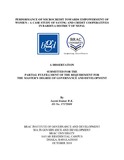Performance of microcredit towards empowerment of women – a case study of saving and credit cooperatives in bardiya district of Nepal

View/Open
Date
2018-10Publisher
Brac UniversityAuthor
B.K., Laxmi KumarMetadata
Show full item recordAbstract
Microcredit has often been seen as an important means of empowering women. A study was
conducted in the Mid-Western Development Region of Nepal to explore impact of microcredits
in women’s empowerment. A total of 32 women borrowers of micro-credit was
randomly selected from eight cooperatives. A pre-tested questionnaire was administered to
collect the data. Qualitative information was collected through case studies.
Most of the survey respondents (94%) are over the age of 25. Nearly three-quarter of the
respondents did not have formal education. About 44% of respondents have an average
monthly income of NRs. 11000-20000 (94-170 US$). Only 3% have average monthly income
below NRs 10,000 (85 US$) and 6% have income above NRs 50,000 (427 US$).
All respondents maintain a savings account – 88.5% with cooperatives and 12.5% with the
bank. Most of them (90%) have a regular savings pattern. All respondents received
cooperative loans with 41% borrowed loan for more than three times and 19% borrowed loan
only once. Approximately 31% of respondents also borrowed loan from the micro finance
institutions. Nearly 94% of respondents repaid their instalments on time.
The study shows different levels of impact on the role of micro-credits in women’s
empowerment. In the case of women’s decision-making power and change in the attitude of
men towards domestic violence, there was no change in the status of women, even after
joining cooperatives and borrowing micro-credits. However, more than two-third of
respondents indicated that their respect had improved significantly in the family. With respect
to participation in community activities, 60% of respondents felt that it had improved after
borrowing micro-credits. Almost 53% also indicated that their communication skills had
improved than before. About 94% of respondents reported having improved confidence in
their work or business.
The data are collected by perception survey that only provides information about what people
feel or think. A longitudinal study involving a control group and more respondents in the
treatment group is recommended to validate the findings of this study.
